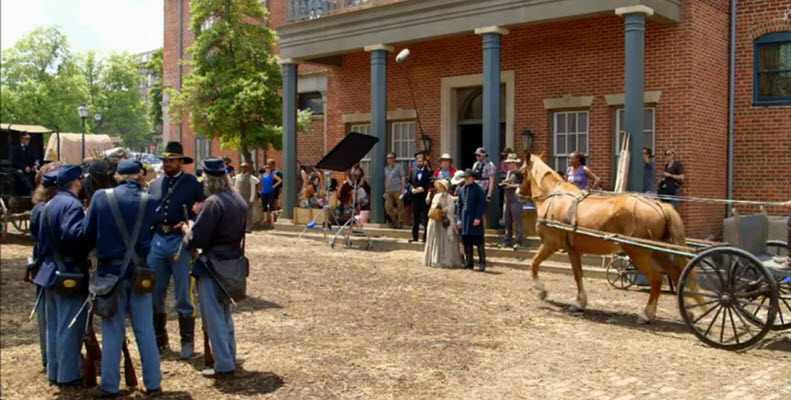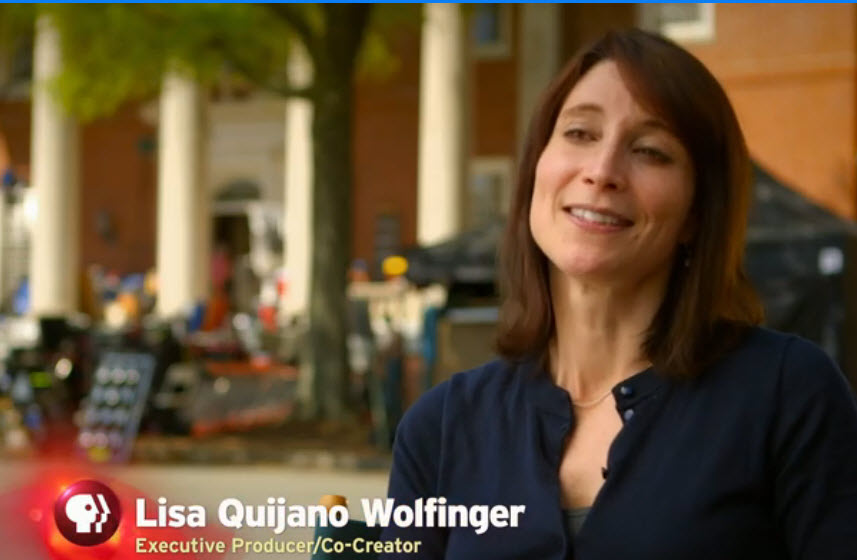Jordan Wright
October 8, 2015
Special to The Alexandria Times

Mercy Street: Behind the Scenes
On November 5th the Alexandria Film Festival and Visit Alexandria will host the premiere of PBS Masterpiece Theatre’s new Civil War era miniseries, Mercy Street. Based on true stories and set historically in Alexandria, the drama tells of love, war and medicine on the home front. Ruled under martial law, Alexandria was once the melting pot of the region, filled with soldiers, civilians, female volunteers, doctors, the wounded from both sides, runaway slaves, prostitutes, speculators and spies.
The private screening will kick off the city’s ninth annual film festival, which runs from November 5th through the 8th at both the AMC Hoffman 22 Theater and Beatley Central Library. The festival will also include an advance screening of Love The Coopers and many more. For information and screening times go to www.AlexandriaFilm.org
Lisa Quijano Wolfinger, who has written, produced and directed a wide range of genres, including drama, historical docudrama, high-end documentaries and reality, is the Co-Producer of the PBS Masterpiece Theatre mini-series, Mercy Street. Her work includes the critically acclaimed three-hour docudrama special for the History Channel, “Desperate Crossing, The Untold Story of the Mayflower”, nominated for two primetime Emmy Awards; the two-hour special, “Fire on the Mountain”, nominated for a News and Documentary Emmy and awarded the CINE Masters Series award; the 90-minute Salem Witch docudrama titled “Witch Hunt”, nominated for a News and Documentary Emmy; and the docudrama miniseries, “Conquest of America”, nominated for a Primetime Emmy and winner of a gold medal at the New York Film Festival. Wolfinger will be on hand for the premiere along with some of the cast members to participate in a Q & A.
Interview with Lisa Wolfinger
What initially drew you to focus on American history throughout your career?
That’s an interesting one! I was educated overseas, but I am American. I spent most of my school years in France and England so my focus was on European History. When I married and moved to the States, I realized I knew very little about American History. So I began working my way up to it through a number of historic documentaries. For Mercy Street I looked into the Civil War. It seemed like the next step for me. I was especially drawn to the medical side. I wanted to find a fresh window and I discovered a very interesting story about the medical side of the war that had never been told. It’s a crucible in many ways. It’s what I like to call the beginning of modern medical science.
Why did you want to tell this particular story?
What excited me most of all were these very daring female volunteers who were the first nurses coming into this conflict, trying to make a difference. But there were other elements of the story that also excited me. By setting it in a Union hospital in Alexandria, Virginia, it also gave me an african american story line.
Audrey Davis, Director of Alexandria’s Black History Museum, gave expert historical background on Alexandria’s early African American experience. What did she share with your other advisors and what intrigued you the most about the city’s history?
When I settled on the medical side of it, I realized I had to focus on that story rather than the battles. I started looking into general hospitals behind the front lines. I stumbled on a story about Mansion House, about a hotel turned Union hospital in Alexandria, Virginia. The article was written by the curator at Carlyle House. It was also the story of Mr. Green, a local entrepreneur, who built this hotel on his front lawn. Through that angle I realized that the Green family stayed in town during the war living side by side with the Union occupiers. It gave me a family saga with the Greens and a medical story as well. The setting was so rich and rather unique in many ways.
There is an important and fascinating side to the story referencing women’s places in the medical profession. As a woman, was it important to you to include this?
Absolutely. That is the story I wanted to tell as a female filmmaker. It’s important to tell stories of remarkable women and what I loved about this story is that these are not iconic women, nobody has ever heard about them, and yet they are based on real people who did extraordinary things. Women coming in and conquering prejudices and trying to make a difference.
You have assembled an amazing cast of famous television stars from some of TV’s hottest series. How much training in nursing care and Civil War era behavior did they get before shooting?
Oodles! Because I come from a filmmaking history background, the one thing that was going to make this series special was attention to detail. So we brought in a whole panel of advisors to make the world look real and believable and authentic. The cast was so eager to throw themselves into the Civil War until it became second nature.
Alexandria recently celebrated its Sesquicentennial, but there’s still controversy over a statue at Prince and Washington Streets honoring Confederate General Robert E. Lee. How are the relationships between the Union soldiers and Confederate sympathizers expressed in Mercy Street?
We worked very hard to create a world where we represent different and points of view. We have unpleasant characters on both sides of the conflict and we don’t shy away from it. It was a very complicated time with brothers fighting brothers. James McPherson is one of our advisors and in one of his notes he was concerned that we were romanticizing some of the Southern characters, so we had to find a balance on both sides of the conflict. We also have some very strong African American characters with a very strong voice.
Are there still Southern slaves in the city at this time? And how do they interact with the Union troops or free slaves?
We dealt with that. Season 1 takes place in the spring of 1862 and the refugee slaves in Alexandria were protected by the Union Army and called contrabands but they are not technically free. We have many different points of view including from the African American perspective.
Mercy Street has one of the best slots in television – – following Downton Abbey. Can this miniseries hold its own against one of the most beloved series on “Masterpiece”?
Yes, but it’s like comparing apples and watermelons. They both have strong ensemble casts. But Mercy Street but this is a big, epic story. Downton Abbey audience will very much enjoy this story about the North and South. There’s humor, romance and intrigue whether you’re a Civil War history buff or romance buff.
Who designed the costumes?
Amy Andrews Harrell who lives in Richmond designed and constructed many of them. With one dress she incorporated a fabric she found on eBay that came from somebody’s attic that dated back to 1860. She was able to build upon the costumes with authentic period lace and accessories and other fabrics. Amy is known for her work on Lincoln and On Cold Mountain and many other period shows.
Is there anything you would like to say about the premiere in the city that it takes place?
We are very excited to show the film here in the city where it is set. It seems so fitting. The actors are looking forward to coming down for it because they ingested the period by osmosis.
